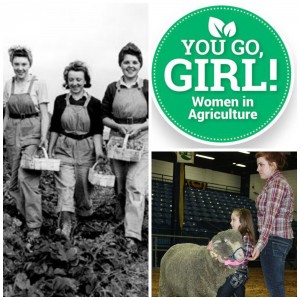During the 2015 Super Bowl, one of the commercials that created a buzz was a 60-second spot that highlighted the Always brand’s “Like a Girl” campaign. The ad showed the differences in how adults and children perceived the phrase, “like a girl.”
Individuals were asked to demonstrate what it means to do something, like fight, throw or run, “like a girl.” The adults and even young boys gave prissy or buffoonish examples, arms or legs flailing, or worried about their hair.
But the young girls simply showed how they would throw a punch or a ball, or run as fast as they could. With intensity, grit and strength.
Always was trying to fight the stereotype that girls — women — can’t “do” something with the same determination and talent as their male counterparts.
This week, we kick off an eight-week series on women in agriculture, You Go, Girl. It’s our hope that by spotlighting eight amazing, intelligent, driven women in various facets of agriculture, we can help dispel the myth that females farm “like a girl,” and that they are perfectly capable of farming. Period.
But as we were preparing the series, the questions from a co-worker were legitimate: Why are we doing a series on women in agriculture? Are we going to do one on men in agriculture? Any why now?
Women farmers and female ag industry managers and leaders are still the exception, not the rule.
Twenty-six years ago this spring, Farm and Dairy did a similar series on women in agriculture, and I remember the stories I wrote like it was yesterday. Twenty-six years, and nothing’s changed.
Agriculture is still a predominantly male occupation, and the new salesman coming down the lane still asks a woman farmer, “Is your husband around?”
The number of total women farm operators — 990,543 — dropped 2 percent between 2007 and 2012, according to the latest U.S. Census of Agriculture. The number of women principal farm operators fell by an even larger number — 6 percent — to 288,264.
There are traditional roles, like managing childcare, that also add to the stress of being a full-time female farmer. And there are unspoken stereotypes that challenge women farmers, like being taken seriously by some.
Twenty-six years, and yet everything has changed.
While the most recent Census of Agriculture shows a drop in female principal farm operators, the total has been steadily increasing since first tracked in 1978.
Overall market value of products sold by farms with women as principal operators was $12.9 billion — $12.9 billion! — in 2012, up from $11.1 billion in 2007.
But beyond the numbers, even in the still-male-dominated world of agriculture, I think there is greater recognition that women can be as effective as men at owning or managing a farm.
We’re not alone in our effort to draw attention and encourage women in agriculture.
- Just last month, U.S. Department of Agriculture Deputy Secretary Krysta Harden announced the creation of the Women in Agriculture Mentoring Network. This new network is designed “to support and engage women across all areas of agriculture and to foster professional partnerships between women with shared backgrounds, interests, and professional goals.” You can offer your suggestions by email to agwomenlead@usda.gov.
- The Pennsylvania Women’s Agricultural Network (PA WAgN) also actively supports women in agricultural through networking, mentorship and educational opportunities. It’s been in place — formed by a group of women farmers and Penn State researchers — since 2005. (Learn more at http://agsci.psu.edu/wagn.)
- A similar group with the same goal of education and networking is in Ohio. The Ohio Women in Agriculture is hosting its second annual Women in Agriculture Conference March 27 in Tuscarawas County.
- Extension educators from 11 states lead the Extension Women in Agriculture National Learning Network, working to provide education and technical assistance to women farmers. (Learn more at www.extension.org/womeninag.)
- The American Agri-Women, formed in 1974, advocates for agriculture, regardless of state or commodity.
Agriculture is still a man’s world. But we want to show that it’s also a woman’s world.
That it’s OK to farm like a girl.
More women in ag stories:
- Ones to watch: Young women in agriculture April 23, 2015
- At the helm of Ohio Cattlemen’s, Elizabeth Harsh works to ‘be fearless daily’ April 23, 2015
- Farm or nonfarm worlds: Extension dairy specialists know both sides April 16, 2015
- Ohio State researcher committed to the science of animal health April 9, 2015
- Donniella Winchell puts Ohio wine on the world stage April 2, 2015
- Breaking the ‘grass’ ceiling: East Ohio Women in Agriculture Conference draws 135 March 30, 2015
- Annie Warmke: Back to the Earthship March 26, 2015
- Leah Miller helps farmers, communities get things done March 19, 2015
- Judy Ligo: ‘I had to prove I knew what I was doing’ March 12, 2015
- Pitching farm life: Brenda Hastings takes dairy industry in an all new direction March 5, 2015
- The ones to watch: Help us find the millennials who will be tomorrow’s leaders in agriculture March 5, 2015














Thank you for doing the article. Farming has changed so much so has farm woman. They work at home,sometimes off the farm then make sure the kids do other activities. But manage to keep everything going. But mainly work on the farm.
I am deeply moved by the thoughtfulness of this first article, and especially the editorial you wrote. It seems as if we are invisible in the farming world, but for a few moments it’s clear that we’re more than holding up half of this sky, and doing it our way. Thanks so much.
We are women farmers from the Philippines. We are a drop in a bucket – this is what we practice and promote at The Pitak Project founded by women: that small is good and that small farms can thrive. We invest in nature and give back to our community. We now face a critical issue: Water! Aside from the other interventions we’ve done to hold, catch, and store water during the wet season, the land is dry and water is scarce for 6 months! A solar powered deep well pump will address this. We will be productive the whole year round; we will set an example of a renewable energy method of accessing water; we can have more people at the farm to share and learn during summer; we will become self-reliant and have surplus to share; and the community will have water source in the event of drought and disaster (400 families). We need your help. Please write about us we need all the help we can get. Thank you. bit.ly/1zPszPY